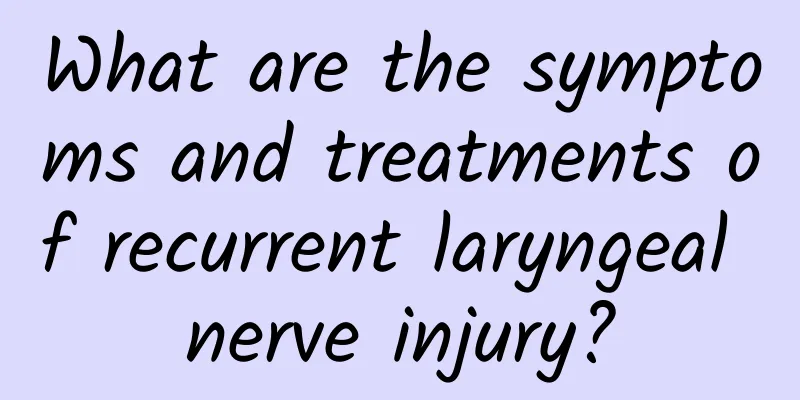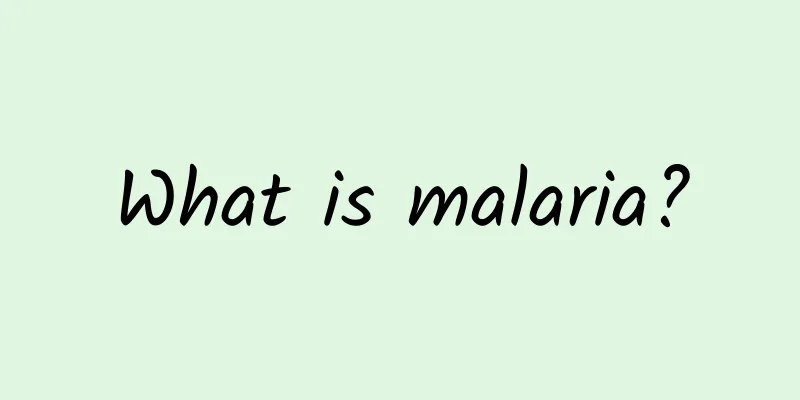What are the symptoms and treatments of recurrent laryngeal nerve injury?

|
The recurrent laryngeal nerve is one of the most common nerves in our otolaryngology department. Like the superior laryngeal nerve, it is a branch of the vagus nerve. It is mainly a motor nerve that innervates all the laryngeal muscles except the cricothyroid muscle. What are the symptoms of recurrent laryngeal nerve injury? 1. Manifestations of recurrent laryngeal nerve injury The specific location, type, and degree of recurrent laryngeal nerve injury are quite complex. Due to limited conditions, we mostly speculate through clinical observation. When the recurrent laryngeal nerve is injured, the abductor muscles are paralyzed first, followed by the vocal cord tensor muscles, and the adductor muscles are paralyzed last. According to the degree of damage to the recurrent laryngeal nerve, we generally divide it into incomplete injury and complete injury. Unilateral recurrent laryngeal nerve injury mainly causes hoarseness, but pronunciation may improve in the future due to compensatory effects. When breathing, there is no difficulty because the vocal cord on the healthy side moves normally. Physical examination of incomplete unilateral recurrent laryngeal nerve injury shows that the vocal cord on the affected side cannot abduct but can adduct, so the glottis can still close when pronouncing words. Therefore, there is generally a short period of hoarseness, which then recovers and the symptoms are not significant. However, in complete injury, the vocal cord on the affected side is fixed in the paramedian position, unable to abduct or adduct. In the early stage of pronunciation, a crack can be seen in the glottis. In the later stage, compensation occurs, and the vocal cord on the healthy side adducts across the midline toward the affected side, and the pronunciation improves. In addition to causing hoarseness, bilateral recurrent laryngeal nerve damage can also cause laryngeal obstruction due to the inability of the bilateral vocal cords to abduct and the reduction of the glottis gap, leading to breathing difficulties and endangering life. When the bilateral recurrent laryngeal nerves are completely damaged, they cannot be adducted, resulting in hoarse and weak pronunciation, like a whisper, and difficulty in speaking. The glottis loses its normal protective reflex and cannot close, which can easily cause aspiration and choking. Secretions often accumulate in the trachea, and there is a wheezing sound when breathing. It also needs to be clinically differentiated from rheumatoid cricoarytenoid arthritis and cricoarytenoid joint dislocation. 2. Treatment of recurrent laryngeal nerve injury For those with clear causes of illness, appropriate treatment should be given to eliminate the causes. Patients with no obvious problems with pronunciation and breathing, such as patients with unilateral incomplete recurrent laryngeal nerve injury, do not require treatment. If hoarseness is obvious and cannot be compensated after 3 to 6 months of observation, and the patient requests improvement in pronunciation, conservative treatment with neurotrophic drugs, glucocorticoids, vitamins, etc. can be given, combined with pronunciation training. Laryngeal physical therapy can be used to promote nerve recovery; if the effect is poor, surgical treatment can be considered, such as nerve anastomosis, neuromuscular pedicle transplantation, phrenic nerve and recurrent laryngeal nerve anastomosis, etc. Of course, for breathing difficulties caused by bilateral recurrent laryngeal nerve damage, tracheotomy should be performed in time to ensure unobstructed breathing. Our experience is that acupuncture, massage combined with Chinese medicine and voice training are effective in treating unilateral vocal cord paralysis caused by recurrent laryngeal nerve injury. Of course, when treating patients with vocal cord paralysis, we must first combine clinical examination and medical interviews to clarify the cause and degree of the disease, so that the patient has a reasonable psychological expectation. After excluding contraindications, comprehensive Chinese medicine treatment should be carried out as soon as possible, and voice training should be carried out as soon as possible to achieve satisfactory results. |
<<: Blood-replenishing porridge for women, drink it to make them look good!
>>: Women’s health: What are the foods that nourish yin and replenish blood?
Recommend
What are the effects and functions of blister beetles?
Everyone must be very unfamiliar with the blister...
Yellow spots on hands
The yellow spots that appear on the hands are cal...
Three situations of fetal heart rate deceleration
Fetal heart rate monitoring helps to observe the ...
What is the Traditional Chinese Medicine treatment for herpes?
Herpes is a common skin disease and may be caused...
How to treat chronic enteritis? Five dietary treatments
Chronic enteritis is different from many acute di...
What is varicocele
Varicose veins are a relatively common male disea...
How to use the contour stick
In order to beautify their faces and make themsel...
Medicinal value of white cardamom
As modern society becomes more and more developed...
What to do if your legs are sore and you can't sleep at night
Leg soreness, especially at night, greatly affect...
What is the sign of scalp pain?
What disease causes scalp pain? We should pay att...
This traditional Chinese medicine recipe for warming the kidney and strengthening yang is amazing!
Traditional Chinese medicine believes that: "...
What medicine should I take for menopausal anxiety?
Menopausal anxiety is a relatively common manifes...
What does a pregnant uterus look like?
When a woman successfully conceives, the fertiliz...
Are there any side effects to the flu vaccine?
We all need to get vaccinations after we are born...
Acute rheumatic fever
Rheumatic fever is a common acute and chronic inf...









